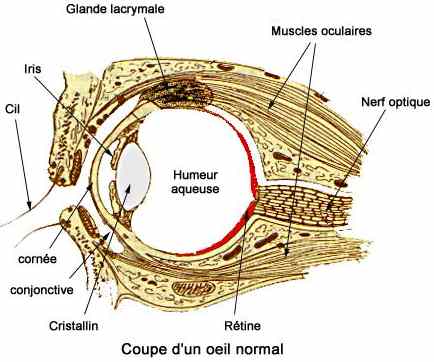Home > Welcome > General medicine > Functional disorders > Head and Sleep > Ocular fatigue
The eye is a self-regulated neurological tool. Its functioning is very sensitive to tiredness.
The eye is a self-regulated neurological tool. Its functioning is very sensitive to tiredness.

The way the eye and its features work is both very quick and automated. The oculomotor muscles are amongst the fastest of the organism and the coordination functions of sight or of its adjustment are almost independant from will.
It is though striking to notice that sleep disorders are never mentioned in front of neurodystonic troubles affecting the eyes.
Ocular fatigue
Migraines and headaches often give cause to a visit to an ophtalmologist and it is often the occasion to detect a more or less severe sight disorder.
The increase of the weekly time spent in front of screens or under artificial lights is often insisted upon without that it is really possible to estimate its true impact : there exist «video game junkies» who spend hours in front of screens without suffering from ocular fatigue or migraine (as far as they get a minimum amount of sleep).
There exist billions of people who work, drive, and live without ever wearing glasses and who neither suffer from ocular fatigue nor migraine.
Also see:
Headaches)
"Stiff neck"
"Eyelids and tiredness"
Clinical case : intolerance to screens
Mr M. is a computer scientist and is one of these modern fathers who take care a lot of their baby. Since some time, he suffers from shooting pains of migraine kind, which he locates like starting from the back of the eyes, and which occur when he is in front of his computer screen. He also complains about frequent earbuzzes, « but it can’t be the blood circulation, I’m only 30». Nevertheless, he is a little afraid to have dizzy spells and has decided to stop sport because he feels tired (all the more since he does not sleep very well despite a recent intake of sleeping pills).
The care of sleep and resuming sport at the occasion of a stop from work of 15 days show good results on the whole set of symptoms.
See "Learn to sleep".
In our experience, ocular fatigue is a very frequent sign of sleep disorders. In overworking and volontary people who are in the situation of «standing fast», tiredness finds there an excellent way to express itself and sometimes ends up in a true handicap like headhache, stifnneck or dizzy spells which are only different clinical forms.
Intolerance to screens is one of the major complaints of sick people who suffer from "fatigue.chronique chronic fatigue syndrome . All patients have consulted one or more specialists without any result and the handicap is only relieved by rest.
In work medicine, the preventive treatment of ocular fatigue induced by some jobs (truckers, nuclear power stations) is soft physical activity under intensive lighting, which has a very powerful arousing effect on the brain from which results an enhancement of the eyes’ performances.
It is thus tiredness which «upsets» sight and not work which «wears out» the eyes, but medical reflexion often proceeds from the opposite logic and it happens that some sick people wear glasses only to work with computer screens although their sight is excellent!
See also in "Sommeil et médecine générale" (in english):

- More information...